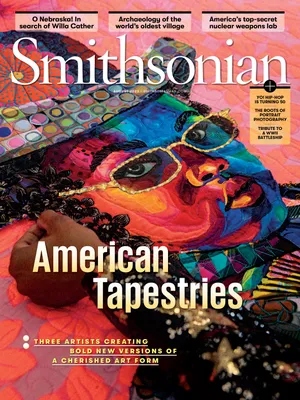How George Washington Wrote His Farewell Address
A candle stand used by the first president illuminates his extraordinary last days in office
:focal(1895x1552:1896x1553)/https://tf-cmsv2-smithsonianmag-media.s3.amazonaws.com/filer_public/b7/f3/b7f3a1b1-23ca-4297-bb99-ce24c59cb190/opener_-_julaug2023_g04_prologue.jpg)
George Washington was a man of many talents. Writing speeches was not one of them. He wasn’t great at delivering speeches, either. And he was thin-skinned. Washington managed each of those imperfections on its own, but when he had to contend with all three at once, he struggled to maintain his legendary self-control. Such moments of apparent weakness are a gift—not so much for him as for me, one of his biographers: Poignantly, they bring Washington to life. If Washington had had his way, he never would have been president. “My movements to the chair of Government will be accompanied with feelings not unlike those of a culprit who is going to the place of his execution,” he wrote to a well-wisher in an uncharacteristically rueful moment ahead of the first inauguration. After leading the country to victory in the Revolution, Washington had happily given up power. But his fellow framers argued that he’d implicitly agreed to be the country’s first president by presiding over the 1787 Constitutional Convention, and in 1788 they pressured him out of retirement.
On April 30, 1789, Washington took the oath of office at Federal Hall in New York City and delivered a ten-minute inaugural address to Congress. In their letters, legislators noted that the hero of the Revolution was clearly nervous. And he was—but he was also annoyed with the pomp. He wanted to get to work.
Washington dutifully spent the next four years on a precedent-setting bender. Satisfied, he tasked James Madison, his close adviser and later the fourth president, with drafting a farewell address. Once again, his fellow founders stepped in. Madison, Alexander Hamilton and Thomas Jefferson prevailed on Washington to serve a second term. After winning unanimous re-election from the Electoral College, Washington found the next four years excruciating—and part of it was his fault.
Washington, who claimed no political party, wrote to Jefferson, “The first wish of my heart was, if parties did exist, to reconcile them.” Ironically, Washington hastened the development of partisanship when he invented the cabinet and offered Jefferson, a Democratic-Republican, and Hamilton, a Federalist, prime spots in it. Should America remain neutral in foreign wars? Were its debts excessive? Who would pay taxes? Jefferson and Hamilton’s bitter arguments spilled into the papers, horrifying the president. His name, Washington complained to Jefferson, was bandied about the papers “in such exaggerated and indecent terms as could scarcely be applied to a Nero; a notorious defaulter; or even to a common pickpocket.” Critics anonymous and otherwise inveighed against his foreign and domestic policies and his leadership as “monarchical” and “aristocratic.” By 1796, he wanted out.
/https://tf-cmsv2-smithsonianmag-media.s3.amazonaws.com/filer_public/cb/a5/cba53e79-e233-4f71-a7e8-05eeb7395ae7/npg-npg_2001_13.jpg)
Now 64, Washington had outlived all the men in his family and did not wish to die in office, which would set a truly monarchical precedent. In the past, Washington would have summoned his ghostwriters, but some of the most literary founders had left government—or else he wished they had. Hamilton was practicing law in New York, while Jefferson had left the cabinet but was still acting surreptitiously as the chief instigator of anonymous anti-Washington propaganda. And Madison, who had written a draft of a farewell address, was aligned with Jefferson. The president, whose formal schooling had ended when he was 14, worked on the draft himself.
According to Eleanor “Nelly” Custis, a step-granddaughter whom Washington raised, the president labored over Madison’s draft for days. Whenever the sun set, a shiny brass candle stand, which entered the Smithsonian collections in 1883, would allow him to work well into the night. With a homemade quill, he applied a heavy hand to the speech.
It would serve as the last will and testament of his presidency. His first draft included such harsh words for Washington’s detractors that Hamilton felt compelled to step in. He advised the president to “embrace such reflections and sentiments as will wear well, progress in approbation with time and redound to future reputation.” Washington took Hamilton’s notes and finished the speech—but would not deliver it to Congress. It wasn’t for them; it was for the American people.
In September 1796, six months before he would leave office, Washington submitted the 6,000-word address to the American Daily Advertiser, a relatively independent publication in an era otherwise defined by partisan journals. He called it “a warning from a parting friend.” By the following year, after Washington had done what he did best—give up power—the speech had been reprinted in more than 100 newspapers. The Farewell Address became, for a century or more, the most popular undelivered speech in history. Students read it in school, patriots memorized portions of it for recitation, and to honor Washington’s birthday, the two parties in the U.S. Senate take turns each year in reading it aloud.
Washington couldn’t predict the future, but a half-century of public service left him with enough wisdom to fashion a shockingly modern document. “It is our true policy to steer clear of any permanent alliances with any portion of the foreign world,” he wrote, concerned that America would be dragged into battles with nations when it would do better to be trading with all of them. His greatest concern, however, was partisanship and the prospect of an authoritarian ruler. Political factions, he said, “incline[d] the minds of men to seek security and repose in the absolute power of an individual.” That leader would use “this disposition to the purposes of his own elevation, on the ruins of public liberty.” Washington’s message was this mandate: We must guard our inheritance. If we allow sectional jealousies to eclipse national interests, the republic will be in peril.
